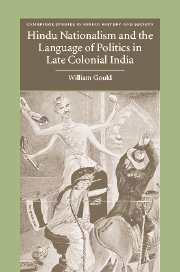Book contents
- Frontmatter
- Contents
- Acknowledgements
- Glossary
- List of abbreviations
- 1 Introduction
- 2 Congress and the Hindu nation: symbols, rhetoric and action
- 3 Muslims, mass movements and untouchable uplift
- 4 The Aryan Congress: history, youth and the ‘Hindu race’
- 5 Congress radicals and Hindu militancy
- 6 Congress ‘Raj’, riots and Muslim mass contacts
- 7 Congress, Pakistan and volunteer militarism
- 8 Conclusion
- Bibliography
- Index
- Other titles in the series
7 - Congress, Pakistan and volunteer militarism
Published online by Cambridge University Press: 11 July 2009
- Frontmatter
- Contents
- Acknowledgements
- Glossary
- List of abbreviations
- 1 Introduction
- 2 Congress and the Hindu nation: symbols, rhetoric and action
- 3 Muslims, mass movements and untouchable uplift
- 4 The Aryan Congress: history, youth and the ‘Hindu race’
- 5 Congress radicals and Hindu militancy
- 6 Congress ‘Raj’, riots and Muslim mass contacts
- 7 Congress, Pakistan and volunteer militarism
- 8 Conclusion
- Bibliography
- Index
- Other titles in the series
Summary
From 1940 political activity in UP was thrown into a new turmoil with the appearance of the Muslim League's Lahore Resolution and ‘Pakistan’ demand. Historians have largely downplayed the effect of the idea of Pakistan on popular politics throughout India, either because the boiling pot of ‘communal politics’ has been sited in the 1920s and early 1930s, or because there has been a focus on all-India politics in this decade. Revisionist accounts of the 1940s and Partition have pointed to the ‘game’ played by Jinnah to set up the Lahore Resolution as a bargaining counter to qualify himself as ‘sole spokesman’ of Muslim India: a position which was not necessarily matched by popular enthusiasm for the idea of a separate Muslim state. On the other hand, the idea of ‘Pakistan’ itself became a common theme in mass gatherings in 1940s' UP, in meetings of support and opposition. Although Jinnah's strongest landlord and urban professional support came from UP, Muslim League appeal was not confined to elites.
This chapter will investigate three themes in relation to UP popular politics in the face of the new League demands in the 1940s. The first two deal with the implications of Congress's on-going ‘Hindu’ image for its Muslim support and the degree to which the UP Congress was directly associated with the programme and activities of the Hindu Mahasabha.
- Type
- Chapter
- Information
- Publisher: Cambridge University PressPrint publication year: 2004



